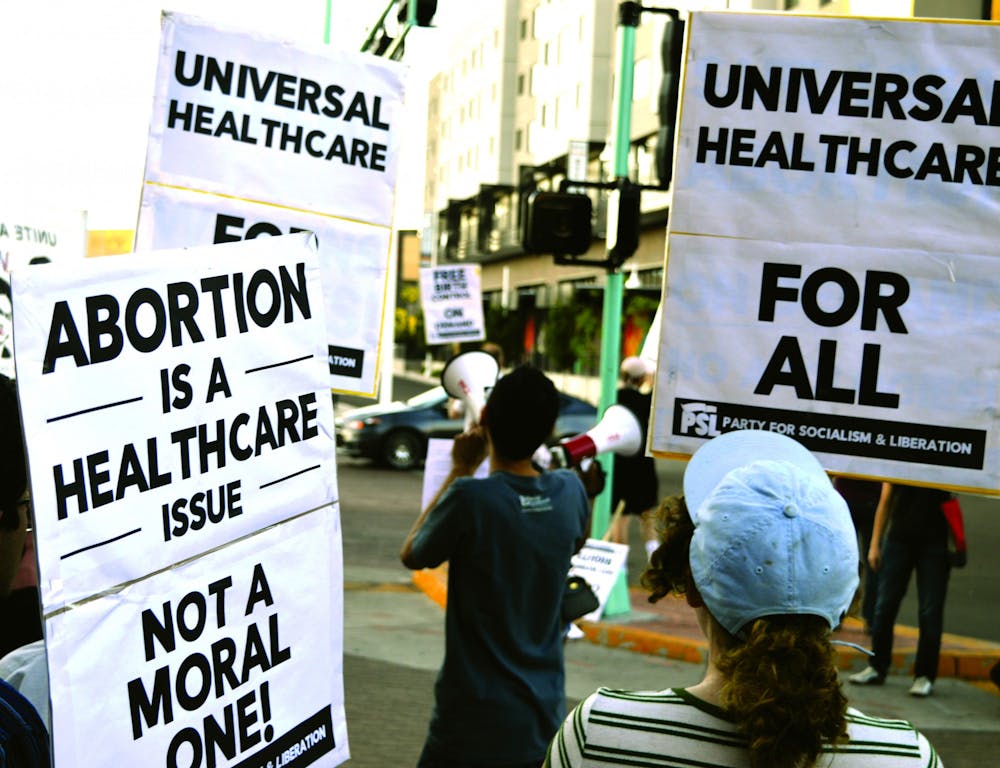With a half-century anti-abortion statute still on the books that has the potential to once again restrict women’s reproductive health care access were the landmark 1973 Roe v. Wade ruling overturned, New Mexico state legislative candidates weighed in ahead of the Nov. 3 election with their stances on decriminalizing abortion.
Pro-choice advocates feel an increasingly more urgent need to decriminalize abortion in New Mexico, especially since the Sept. 18 death of former Supreme Court Justice Ruth Bader Ginsburg, who served as a safety net for abortion health care in the United States.
According to Rep. Georgene Louis (D-Bernalillo), the 1969 New Mexico state law would require “women to get permission from a panel of strangers in order to get an abortion, and even then the panel can only give her permission if she has been raped or if her health is at risk.”
Indeed, the law would ban nearly all abortions except in some very limited circumstances, and the panel of hospital administrators could still choose to reject the patient’s appeal.
Louis said that decisions about abortion for women “are very personal, and something that she should have the right to make with her doctor, with her family, taking into consideration her religious beliefs.”
Katy Duhigg, a Democratic candidate and former Albuquerque city clerk running for the District 10 Senate seat, reiterated some of these concerns.
“With the passing of Justice Ruth Bader Ginsburg, and the imminent appointment of Amy Coney Barrett, it’s no secret that there’s a chance that Roe v. Wade could be overturned,” Duhigg said. “And if that happens, then decisions about reproductive health care, like abortion, go back to the state.”
Due to the aforementioned 1969 law, Duhigg said that abortion could potentially become a felony.
“This is a national issue, and a very pressing one given with everything that’s happening on the national level,” she said. “I think that the New Mexico legislature needs to take these steps and get rid of this law. (Abortion) is a decision to be made between a woman and her health care provider, and frankly, politicians shouldn’t have any say in it.”
Duhigg is running against Candace Ruth Gould, the Republican incumbent who voted against decriminalizing abortion in 2019.
Gould did not respond to the Daily Lobo’s requests for comment.
Duhigg’s argument was echoed by two other candidates for state office. The first was Paul Kinzelman, a Democrat running for election in the New Mexico House of Representatives.
Get content from The Daily Lobo delivered to your inbox
Kinzelman is running in opposition to Alonzo Baldonado, the Republican incumbent from District 8. Like Gould, Baldonado voted against decriminalizing abortion in the 30-day legislative session last year.
In a recent interview, Kinzelman said he would vote to decriminalize.
“I don’t think the government should be involved in those health care decisions,” Kinzelman said. “It’s a very difficult decision for women anyway — they just don’t need another stress factor. Whenever you try to make laws that implement something for everybody, there’s always special cases, corner cases, things that don’t really fit the laws.”
He also argued that as a man, he isn’t competent enough nor has the right to have input on decisions like this.
Additionally, Kinzelman brought up comparisons to other fairly routine medical procedures, such as fixing broken legs and amputating limbs. “There aren’t any laws against this,” he said, “so why are there laws against abortion procedures?”
Baldonado did not respond to the Daily Lobo’s requests for comment.
Democratic candidate Harold Pope Jr., who’s running for the Senate District 23 seat, is running against incumbent Republican Sander Rue, who also voted against the 1969 law’s repeal last year.
Pope reiterated Duhigg and Kinzelman’s claim that abortion is a medical procedure between a woman and her doctor.
“I just don’t believe that it’s my place, or really the government’s place, to get involved in the decisions being made by a woman and her doctor,” he said.
He acknowledged that abortion rights is a campaign issue for him, but said the repeal of the 1969 anti-abortion law was even more critical with Roe v. Wade in the crosshairs in light of Coney Barrett’s nomination to the Supreme Court.
Incumbent candidate Rue did not respond to the Daily Lobo’s requests for comment.
New Mexico is not currently listed as a state with any abortion restrictions, according to the Guttmacher Institute, but bills to decriminalize abortion in the state have failed two years in a row.
The first was House Bill 16, titled “Abortion Decriminalization,” which was postponed indefinitely in 2018. The bill would have repealed the portions of state statute that criminalizes abortion.
The second was House Bill 51, titled “Decriminalize Abortion,” which passed in the House of Representatives with 40 in favor and 29 of opposed. However, it later failed to pass the Senate in a vote of 18 to 24.
If Roe v. Wade is overturned at the federal level, New Mexico will join 15 other states that ban abortion before viability except in cases of rape or incest, when continuing the pregnancy will result in death or grave mental health impairment of the mother or severe mental or physical defects in the fetus.
Sayra Ramos is a freelance reporter at the Daily Lobo. She can be contacted at culture@dailylobo.com or on Twitter @Sayraramos_






